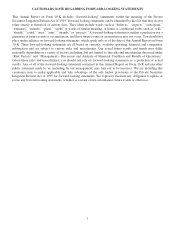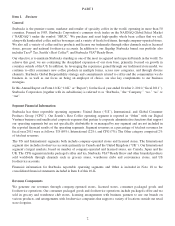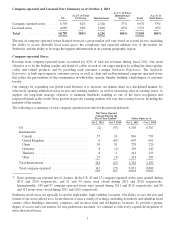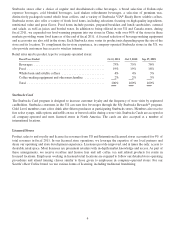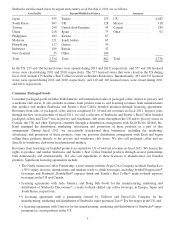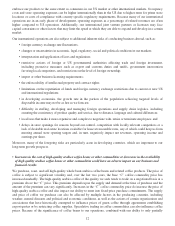Starbucks 2011 Annual Report Download - page 17
Download and view the complete annual report
Please find page 17 of the 2011 Starbucks annual report below. You can navigate through the pages in the report by either clicking on the pages listed below, or by using the keyword search tool below to find specific information within the annual report.•We may not be successful in implementing important strategic initiatives, which may have an adverse impact
on our business and financial results.
There is no assurance that we will be able to implement important strategic initiatives in accordance with our
expectations, which may result in an adverse impact on our business and financial results. These strategic initiatives
are designed to improve our results of operations and drive long-term shareholder value, and include:
• successfully leveraging Starbucks brand portfolio outside the company-operated store base, including our
increased focus on international licensed stores, Starbucks- and Tazo-branded Keurig®K-Cup®portion
packs coffees and teas, Starbucks VIA®Ready Brew, and the Seattle’s Best Coffee brand;
• focusing on relevant product innovation and profitable new growth platforms;
• accelerating the growth of our global consumer products business now that we have transitioned from our
distribution arrangement with Kraft Foods Global, Inc.;
• balancing disciplined global store growth while meeting target store-level unit economics in a given
market; and
• executing a multi-channel advertising and marketing campaign to effectively communicate our message
directly to Starbucks consumers and employees.
•We face intense competition in each of our channels and markets, which could lead to reduced profitability.
The specialty coffee market is intensely competitive, including with respect to product quality, service, convenience,
and price, and we face significant competition in each of our channels and markets. Accordingly, we do not have
leadership positions in all channels and markets. In the US, the ongoing focus by large competitors in the quick-
service restaurant sector on selling high-quality specialty coffee beverages could adversely affect our sales and
results of operations. Similarly, continued competition from well-established competitors in our international
markets could hinder growth and adversely affect our sales and results of operations in those markets. Increased
competition in the US packaged coffee and tea and ready-to-drink coffee beverage markets could adversely affect
the profitability of the CPG segment.
•We are highly dependent on the financial performance of our US operating segment.
Our financial performance is highly dependent on our US operating segment, as it comprised approximately two
thirds of consolidated total net revenues in fiscal 2011. If revenue trends slow or decline our business and financial
results could be adversely affected, and because the US segment is relatively mature and produces the large majority
of our operating cash flows, could result in reduced cash flows for funding the expansion of our international
business and for returning cash to shareholders.
•We are increasingly dependent on the success of our international operations in order to achieve our growth
targets.
Our future growth increasingly depends on the growth and sustained profitability of our international operations.
Some or all of our international market business units (“MBUs”), which we generally define by the countries in
which they operate, may not be successful in their operations or in achieving expected growth, which ultimately
requires achieving consistent, stable net revenues and earnings. The performance of our international operations may
be adversely affected by economic downturns in one or more of our large MBUs. In particular, our Canada, Japan,
UK, and China MBUs account for a significant portion of the net revenue and earnings of our international
operations and a decline in the performance of any of these MBUs could have a material adverse impact on the
results of our international operations.
Additionally, some factors that will be critical to the success of international MBUs are different than those affecting
our US stores and licensees. Tastes naturally vary by region, and consumers in some international markets may not
11


